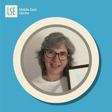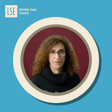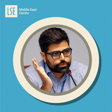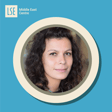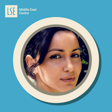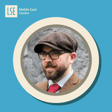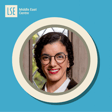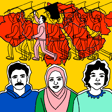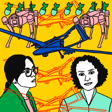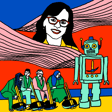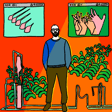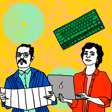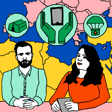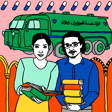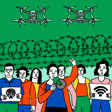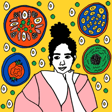Become a Creator today!Start creating today - Share your story with the world!
Start for free
00:00:00
00:00:01

Episode 4: Nadim El Kak on Intersectionality, Trauma, and Being an Insider
In this episode, Nadim El Kak joins Anne Kirstine for a conversation about his research on Lebanon's opposition in the wake of the 2019 October Uprising. Having grown up in Lebanon and previously participated in an opposition group, Nadim has a close and personal relation to this subject. He reflects on the advantages and downsides of this positionality. Nadim also shares his thoughts on inclusion within academia and collaboration between Western and non-Western institutions.
Nadim is an instructor of sociology at the American University of Beirut and a consultant at The Policy Initiative, an independent Beirut-based think tank. His research focuses on politics and social movements in Lebanon.
Transcript
Introduction to 'Conversations on Precisionality'
00:00:03
Speaker
Hello and welcome to Conversations on Precisionality, a podcast brought to you by the LSE Middle East Centre.
Influence of Identity on Research
00:00:10
Speaker
My name is Anne Kirsten Rohn. I'm a visiting fellow at the Centre and in this podcast I set out on a journey to explore how who we are as researchers shape the work we do.
00:00:22
Speaker
As social scientists, we're often told to reflect on how factors such as our gender, ethnicity and age play into our research. But how do we do so in practice? What are the challenges and opportunities that come with having a certain positionality? And how do we become aware of these?
Nadine Milkak: Background and Research
00:00:40
Speaker
In this episode, I'm joined by Nadine Milkak, who will help me understand these questions better.
00:00:46
Speaker
Nadim is an instructor in sociology at the American University of Beirut. He's also a consultant at the Policy Initiative, which is an independent Beirut-based think tank. He's done some fascinating research on politics and social movement in Lebanon, and has written about these topics in a range of well-known international blocs and outlets, such as the New Arab and Jadaliyeh.
00:01:08
Speaker
He also recently defended his master's dissertation on the trajectory of the new opposition movement in Lebanon following the 2019 October uprising, which I'm very curious to hear more about. And finally, Nadim is one of the people who have inspired me to reflect more on my own positionality, which is why I'm very happy to have him with me today. So welcome Nadim and thank you so much for being on this podcast. Thank you, Anne, for having me. I look forward to our conversation.
00:01:39
Speaker
Well, so do I. We're dealing with a really complex issue. Just the concept of positionality itself, I think, can be difficult to define and describe in a precise
Positionality Challenges in Social Research
00:01:50
Speaker
way. And that's also why I would like to begin this conversation by asking you how you define the concept in your work.
00:01:58
Speaker
I guess for me, positionality, it's often framed in terms of identity politics. My research tries to look at it more in an intersectional lens that also tries to account not only for racial and colonial relations, but also for class dynamics and for other subjectivities and identities that arise along the way as we do research. And obviously these things will vary a lot based on context, research questions, themes, history, and so on.
00:02:27
Speaker
I think it's a very complicated concept that hasn't been engaged with a lot across disciplines in the social
Reflections on Lebanon's 2019 Uprising
00:02:34
Speaker
sciences. So there's still a learning curve there. And I think that no one has truly mastered the art of dealing with one's positionality because we live also in an increasingly interconnected world and it's becoming harder and harder to be aware of all the contextual and cultural sensitivities that arise when doing fieldwork.
00:02:56
Speaker
And I guess one of the things that really make it difficult for us to deal with our positionality is exactly as you say, that it varies with context, with the people we speak to, over time also. And I think you have some interesting reflections on this in your master thesis actually.
00:03:13
Speaker
where you describe the way your relation to the topic your study has changed throughout the past years. So as you write, you were involved in the 2019 October uprising in Lebanon as part of a group called Lihakri, which is a leftist group that was active in the streets alongside other groups and networks. But after the uprising, you stress that you became less involved with this group and were away from organizing circles for over two years before you actually started doing your research.
Objectivity Post-Uprising
00:03:42
Speaker
And that made me interested in hearing more about this process of distancing and what it meant for your positionality and for your research more generally. Just to give listeners some context, so when the uprising started in October 2019, I was researcher at the Lebanese Center for Policy Studies, where we were already doing research on the uprising, on political reform, and most of this research was fieldwork based. And in parallel, I was also already engaged with Lihatki,
00:04:12
Speaker
which had emerged in 2018 before the parliamentary elections. And my undergraduate thesis when I was still a student in the U.S. was about klihapki and their experience in grassroots organizing and participatory democracy. And so these were some of the leftist principles or ideals that drew me to the organization.
00:04:33
Speaker
And when the uprising first started, there was a lot of this organic solidarity that emerged, a lot of things that would happen in the squares of the uprising, which would require different forms of interventions and debates and so on. So being organized within the Haki helped also ground me, have access to a community to discuss what was going on, and to also feel like we are able to try to organize this movement that was bringing people from so many different backgrounds.
00:05:01
Speaker
But obviously, a lot of challenges started arising with time and also the financial crisis really started affecting everyone. So little by little, people had to go back to their jobs. There were no longer open strikes. So all of these things ended up leading into 2020 and the pandemic. That was when I started my master's degree.
00:05:21
Speaker
at AUB and since we were already under lockdown and the oppositionist sphere was already starting to take a step back and it was culminated by the August 4 port blast where a lot of remaining hopes for change were buried so this distance and reckoning with
00:05:38
Speaker
The foiled uprising that had been with the counter-revolution from within and without was really useful in allowing me to gather my thoughts and to somewhat deal with this traumatic year, year and a half that the country had experienced.
Interviewing Diverse Political Groups
00:05:54
Speaker
I imagine that must have been an intense process. And I think it's interesting how you also learned about your relation to the topic when you were writing up your research, not just while you were conducting it. But I would still be curious to hear a bit more about your reflections on positionality,
00:06:12
Speaker
in the earlier steps of your research process and especially how you reflected on your previous involvement. Because you did a range of interviews with people from different opposition groups in Lebanon and for those listeners who are not familiar with Lebanon's opposition politics, I can tell that those groups varied quite a lot in their views and also in their political ideology.
00:06:34
Speaker
which means that you were interviewing both people that you had engaged with and agreed with on a personal level and people whom you disagreed with politically and had maybe been debating with previously. So I'm interested in knowing how you navigated your positionality when talking to members of these different groups and also how you prepared for the interviews.
00:06:58
Speaker
I think that one thing that came with the fact that I was already in those spaces is that I had already engaged in a lot of those conversations so I could anticipate the types of answers and responses that I may be getting. And so I had this exercise of editing my interview protocol depending on which person I was going to talk to because when it comes to asking about
00:07:22
Speaker
analyzing the situation, political change, it's very common to hear the same kinds of discourses re-emerge about anti-corruption, anti-sectarianism, all those buzzwords that were common across spaces from the opposition. So when I was with people that I had paraprofamiliarity with,
00:07:39
Speaker
there was already this mutual understanding that we were in those same circles, those same spaces, so the entry to the field becomes much easier because the person is much more comfortable sharing everything they want to say with me because they know who I am, they maybe think that I have similar views to them or that I may align in terms of my views. Obviously in the interviews themselves I don't have the activist hat on and I'm more trying to engage with
00:08:03
Speaker
the intellectual inquiry rather than going into details of events that i had already researched so when it was dealing with more challenging interviews with the ones that were from let's say right-wing groups within the opposition or people that i questioned a bit their backgrounds or their motives or whether they had some
00:08:25
Speaker
ties to traditional political camps, it was harder because sometimes you had to try to prime them to feel like they can discuss some issues. So there was a particular interview that stood out where we talked a lot about class and poverty, and they had this very meritocratic view of the world where they attributed poverty to one's incompetence or
00:08:51
Speaker
drug addiction or whatever other possible distractions there may be. And so I didn't need to necessarily directly ask them about their stances on controversial policy issues or let's say the privatization of state assets, but I would rather try to engage with how they view the world and how they view the political system, the economic system, how they explain different social inequalities. So that way I felt like I had the firmer grasp of
00:09:21
Speaker
where those people were coming from or what was the basis upon which they made their political decisions, their political stances, their programs and so on. Because when I would try to ask them directly about a stance that they know is controversial, that they've already engaged with,
00:09:39
Speaker
They already have an answer that's prepared that's about diluting the facts or about trying to push away some of the potential criticisms that they may have already heard. And so that way I felt like it allowed me to have a more honest relationship with my interlocutor despite knowing that we may not see eye to eye but I don't want to
00:10:02
Speaker
have this turn into a debate between me and my interviewee.
Emotional Toll and Objectivity in Research
00:10:05
Speaker
So it becomes about what kinds of questions does one ask and how can they confirm or deny prior hypotheses that I may have come up with before going into the field.
00:10:17
Speaker
I think it's interesting to hear how you sought to downplay your activist positionality. Did you ever discuss this openly with the interviewees? And if so, was it difficult for you to convince them that you were wearing the researcher hats and not the activist hat?
00:10:34
Speaker
So in some cases, people would ask me if I was still with the hockey. And because I had this distance, it helps a lot, I think, with a lot of my interviews in terms of telling them that I haven't been part of this group for over a year. So more them recognizing that I have this researcher or academic
00:10:53
Speaker
hat on and that this was ultimately going to come out in an established institution at the UB, that my research was being properly supervised, that I'm not a journalist who's going to go badmouth them in front of the public. So I think a lot of those concerns got appeased once they knew that there was this distance. If I didn't have this distance and I was still a political activist, I think it's
00:11:18
Speaker
would have been harder, there would have been more self-censorship I expect and generally it's not a comfortable space to be in. Since I finished this research on a personal level I did not want to do this kind of work anymore because I felt like I was too emotionally invested in my line of work and in the questions that I was engaging in and I was really impacted by them so
00:11:40
Speaker
It took a lot emotionally and I feel like it's also important to have this distance when it comes to the research one is engaging with. Just like with positionality, we often speak of proximity and the importance of proximity, but in my case, it's another extreme. So I guess I see it more alongside a spectrum where I was too immersed and I feel like I couldn't necessarily do justice anymore to my topic because I knew that I felt a lot of
00:12:08
Speaker
anger of pain of memories related to my subject matter and I didn't want to be constantly forcing myself to engage with those triggers as I am doing my research and it became like too much emotional labor and started making me question how objective I was able to be in my accounts and in my writing.
Shifting Focus to Sports Research
00:12:30
Speaker
I think this speaks to something you said to me before we started recording
00:12:34
Speaker
which is that you have reflected a lot on your positionality in the time after you finished your dissertation. And I would be interested if you could elaborate on these hindsight reflections a bit and explain what it was that led you to question whether you should continue doing research on Lebanon's opposition.
00:12:55
Speaker
I'm going to try to elaborate my thoughts because I haven't quite thought about this a lot but I think at the time I was trying to find some kind of closure with my own relationship to the revolution and writing this research was my way of closing the chapter on it and I felt like I was doing it a lot more for personal and sometimes selfish reasons
00:13:17
Speaker
I did not want being so emotionally invested in my work. And at the end of the day, recognizing that when this is like your full-time job, when this is what you need to be doing day in and day out for years and years to become truly familiar with your subject matter, with your research, to getting books and academic articles published, dispositionality was not something I was comfortable with.
00:13:37
Speaker
I wanted to somewhat make a shift and now I've shifted more towards researching post-revolutionary societies but through the lens of sports and specifically sports teams.
00:13:48
Speaker
Last year, Lebanon's national basketball team made a huge noise in the media, where a lot of people who had been used to only negative news coming out of Lebanon and disappointment and feeling ashamed of being Lebanese and just wanting to emigrate, that suddenly there was something that gave people pride, and especially the youth in Lebanon.
00:14:07
Speaker
like the disenfranchised youth that were stuck in the country and suddenly they felt like oh there are these players who grew up just in the same environment as us who had traveled halfway across the world represented us and it gave this strong emotional will and I started doing more research on those ultras groups in different places around the Middle East and started learning more about the role of
00:14:33
Speaker
football fan clubs in Egypt and their role in starting the uprising in Egypt because the most organized people in Egypt were the football ultras. They had been organizing by the thousands for years and years and doing elaborate schemes and having those radical political views that were embedded in football but showed something more.
00:14:54
Speaker
So anyways, I digress, but the idea was that I wanted to move to something where I felt there was more hope, that there was something new, also this newness maybe gave me a bit of distance positionality wise and that allowed me to not be as anxious when I'm doing my
Local vs Foreign Researchers in Lebanon
00:15:10
Speaker
research. That makes one a better researcher when you don't have to calculate everything and your own positionality and how each thing you're writing makes you feel and whether you're being biased.
00:15:20
Speaker
I think everyone does this reflective exercise in their research, but when you're too immersed in it, you're just putting so much load on oneself. And I think this was in my case, but for someone else who is going into a field that they're unfamiliar with completely, there's a different set of challenges that emerge.
00:15:37
Speaker
Absolutely. And I can relate very much to this particular set of challenges from my own research on Lebanon. Because even though I have lived in Lebanon for some periods and studied at the Lebanese American University in Beirut, there's still so many aspects of Lebanese society and politics and culture and language that I feel at least partly unfamiliar with.
00:16:01
Speaker
And this sometimes makes me ask how my research would have looked like if I were Lebanese. What are the things, what are the details that I overlook when I'm doing research on Lebanon as a non-Lebanese? And you're right, it's important to remember that being extremely close to the subject you study can also be a challenge as it is in your case.
00:16:22
Speaker
But I still guess being Lebanese gives you some advantages when studying Lebanese politics. So I would be curious to hear how you've experienced these advantages in your work.
00:16:35
Speaker
I think that when it comes to Lebanon and any country for that matter, the experience of living in a place for multiple years and having experienced the context as a child and then as a young adult, having spoken to people across regions, when I enter a space, people who see me, see someone who is familiar to them, who speaks the same language or the same accent,
00:17:02
Speaker
When there's someone who's an outsider coming into the space, automatically the space changes and that's what the literature speaks about. And there's a process of gaining the entree to the field about getting this approval from the community that one is researching.
00:17:19
Speaker
So I think my advantage is that people who talk to me already know that I know what they've been through. Whereas if it's an outsider, they may feel like they need to do a lot of background context and change their type of approach and discussing it with an outside researcher that may leave out some of the more intricate detail, the nuances that really make the story.
00:17:43
Speaker
Of course, here it's about the researcher and the questions they asked, but the discussion may be a bit more surface level.
00:17:50
Speaker
But I don't think it's always the case because you can also have a Lebanese researcher who's a bad researcher, just like someone come from the outside and have much better questions, much better grasp of the literature and so on. So it's not just an descriptive identity like nationality that dictates that. But of course, as a researcher, there is this advantage of having familiarity with a context.
00:18:15
Speaker
I think for most foreign researchers who want to work on the Middle East, I guess all of them try to learn the language as a first step to be able to start breaking down some of those barriers. And I'm sure you can speak a lot more on your process or the steps that you thought you needed to take to make it easier to get the knowledge and the information, the connections that you need, right?
Importance of Local Context in Research
00:18:39
Speaker
Definitely, and it's still an ongoing process for me to familiarise myself with Lebanon. But I think language, as you say, has helped me a lot. So for instance, being able to have conversations in Arabic
00:18:54
Speaker
has allowed me, I think, to get a better understanding of how people talk about politics and why they talk about politics the way they do. But I also think you're right in pointing out that nationality and familiarity with language, for instance, is not the only thing that determines how much of an outsider or insider you are. And I like that you pointed to class, actually, because I imagine in a country like Lebanon, which has such a high level of inequality, class background,
00:19:24
Speaker
probably matters a lot also for Lebanese researchers, right? Yeah, and I think Lebanon is a highly classist society from its very inception. And it's very much present within researchers from Lebanon who feel like maybe they have some kind of superior understanding to what the poor are dealing with.
00:19:45
Speaker
even more so than they can speak for themselves sometimes. So there is often a projection of what's going on, which might not become as easily for an outside researcher who would be much more wary about maybe making those assumptions.
00:20:01
Speaker
they may end up making false assumption without realizing it or because of what someone told them. And I think this is where the difference may come in. An outsider may have more trouble identifying what are the tropes that are common in Lebanese society, but are actually rooted in stereotypes or are ahistorical or that miss some historical facts. So I think it's a complicated conversation because each researcher brings their own baggage with them.
00:20:31
Speaker
And this may be embedded in where they've lived, but also their skin color, their gender, their sexuality, their lived experiences, and their class position. Ultimately, I do think that there is more to gain from local researchers doing research on their local settings because of their proximity to the field, but it's just a harder task.
00:20:52
Speaker
for an outside researcher. It's not an impossible task to do and it's often necessary because if someone wants to remain locked within the artificial boundaries of their country as a researcher, it also limits a lot of the ability for intellectual growth and for comparative perspectives and so on that are also really important.
Institutional Influence on Positionality
00:21:09
Speaker
I agree with you that it is. And one of the aims of this podcast is also to talk about how we can address these challenges that come both with our personal baggage as researchers, but also with our institutional background. And that also involves being aware of our blind spots, right? So the things we don't talk enough about. Now, as we're approaching the end of this episode,
00:21:35
Speaker
I'd like to ask you what you think we should talk more about in our future conversations on positionality. I think foreign institutions who are willing to send their researchers, their students abroad to do fieldwork, must be much more willing to allow those researchers to spend longer periods of time, and not just longer periods of time, multiple stretches. So having this distance of
00:21:57
Speaker
doing field work for at least a month or two and then coming back reflecting on those field notes then coming back a few months later with this added perspective while obviously as we discussed having more of cultural knowledge of language geography history and so on which is essential to do even before entering the field because that's the
00:22:19
Speaker
bare minimum that can be done to help speed this learning curve once you come in. And I think that's a structural issue really where the institutional limitations or some schools not valuing the importance of this immersive field work that needs to take place to establish this familiarity and proximity to the field.
00:22:41
Speaker
I think you raise an interesting point here because the conversations I've had on positionality with my colleagues so far, most of them have been inward looking. They focus mostly on our personal identity, like you mentioned, our gender, nationality, and so on, and what that means for our research and how we navigate it on an individual level. But it's really only recently I have started to discuss these more structural issues.
00:23:10
Speaker
how institutions are part of a positionality and even prevent us from exploring and developing on our positionality.
Overcoming Institutional Barriers
00:23:19
Speaker
So I would like to hear how you think these institutional barriers can be addressed. What would be the benefit of Western institutions trying to learn more from non-Western institutions? And how could that learning process look like?
00:23:34
Speaker
Well, I'm at UB at the end of the day, so those colonial dynamics that exist in academia are everywhere, unfortunately. Since I was a kid, I was first in a French school, and then I did my BA in the US at Amherst College, and I did my MA at the American University of Beirut.
00:23:52
Speaker
So these indigenous perspectives and these partnerships between Western universities and local universities are very rare. And you usually see those partnerships take place between accredited American institutions or Western institutions. And so there is not enough of discussion between Western institutions and scholarship being produced in indigenous languages.
00:24:15
Speaker
And having more of these networks, let's say, between Western institutions and the Lebanese University in Lebanon, that gives access to a whole different set of scholars, of students, and of thinkers that is different from what you would find in a place like AUB or LAU, can also go a long way in encouraging more people from different class backgrounds, from different geographies that have different
00:24:40
Speaker
sets of privileges from having this cross-cultural intellectual exchange that would go a long way and helping speed up that process of equipping researchers with the tools they need to do ethical and grounded research in the contexts that they see fit.
00:24:57
Speaker
So there's a long way to go. But I can at least say for myself that I've learned a lot from talking to you. And I think our conversation has inspired me, especially to think more about what it means to be insider and outsider to the context we study. So I'm looking forward to keep discussing these issues.
Conclusion and Teaser for Next Episode
00:25:18
Speaker
But for now, thank you so much for being with me on this podcast, Nadim. It's been a real pleasure. Thank you very much.
00:25:25
Speaker
That was the fourth episode of Conversations on Precisionality. Thanks to the team at the LSE Middle East Centre for their work on the podcast, and thank you to the listeners for tuning in. In the next episode, I continue the conversation together with Lucia Ardovini from Lancaster University.
00:25:43
Speaker
Lucia and I will talk about her work on the Muslim Brotherhood and how she, over the years, has come to better understand her role and positionality vis-a-vis different members of the Brotherhood, most of whom live in forced exile. I hope you're listening. See you next week.
